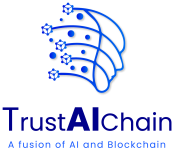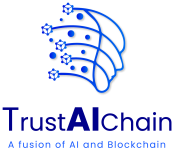Combining Artificial Intelligence and Blockchain for Revolutionary Stock Trading
In the rapidly evolving world of finance, the fusion of Artificial Intelligence (AI) and blockchain technology is paving the way for transformative advancements in stock trading. As an AI Ph.D. candidate with a master’s degree in blockchain technology, I’ve delved into the potent combination of these two technologies to revolutionize how we approach the stock market. This exploration reveals the immense potential of AI, particularly the use of Generative Adversarial Networks (GANs) in conjunction with blockchain’s immutable ledger system, to enhance the accuracy, efficiency, and security of stock trading operations.
Integrating Artificial Intelligence (AI) and blockchain into stock trading isn’t just an innovation; it’s a revolution redefining the boundaries of financial markets. As we delve deeper into this fascinating confluence, it becomes clear that the potential for transformative change is immense, reshaping how transactions are conducted and how markets are understood and navigated.
The Power of AI in Stock Trading
AI has profoundly impacted the financial industry, especially in predictive analytics and automated decision-making. Among the various AI models, GANs stand out for their unique ability to generate synthetic financial data and simulate market scenarios. This capability is invaluable for modeling stock market behaviors and developing strategies adapting to evolving market conditions. GANs consist of two neural networks: the Generator, which creates data resembling the stock market’s actual data, and the Discriminator, which tries to differentiate between real and generated data. Through their interaction, GANs can learn intricate patterns and dynamics of the stock market, enabling traders and analysts to gain deeper insights into potential market movements and enhance their decision-making processes.

Blockchain: A New Era of Transparency and Security
Blockchain technology introduces transparency and security previously unattainable in stock trading with its decentralized and immutable ledger. Transactions recorded on a blockchain are tamper-proof and verifiable by all parties, mitigating the risk of fraud and errors. This enhances trust among participants and streamlines the verification processes, making them more efficient and less reliant on intermediaries.
The advent of smart contracts on blockchain platforms further automates trading and compliance, executing transactions automatically once predetermined conditions are met. This ensures compliance with trading strategies and regulatory requirements and significantly reduces the time and cost associated with trade execution and settlement.
By utilizing a decentralized ledger that records all transactions across a network of computers, blockchain ensures that data is immutable and transparent to all participants. This minimizes the risk of fraudulent activities and streamlines the settlement process, reducing the need for intermediaries and lowering transaction costs. Moreover, smart contracts on blockchain platforms can automate trading strategies and executions. These self-executing contracts with predefined rules can trigger transactions automatically when certain conditions are met, further enhancing the efficiency and responsiveness of trading operations.

Integrating AI and Blockchain for Enhanced Stock Trading
Integrating AI and blockchain in stock trading can be envisioned as a two-pronged approach to tackling the market’s complexity and volatility. On the one hand, AI, through GANs, offers predictive insights and adaptive strategies by understanding and simulating market behaviors. Conversely, blockchain ensures that these operations are conducted in a secure, transparent, and efficient environment.
Predictive Analytics and Strategy Development: GANs can analyze historical and real-time market data to forecast future trends. Traders can use these insights to develop dynamic, robust, informed strategies against market volatility.
Automated and Secure Transactions:Implementing these strategies through smart contracts on a blockchain platform ensures that trades are executed automatically and accurately according to the strategy’s conditions. This automation not only reduces the execution time but also minimizes the potential for human error or manipulation.
Enhanced Transparency and Trust: Blockchain’s immutable ledger publicly records all AI-generated trades and strategies. This transparency fosters trust among investors, regulatory bodies, and participants, ensuring that all actions are verifiable and comply with market regulations.
Real-time Settlements: Combining AI’s decision-making capabilities with blockchain’s efficient transaction processing can significantly reduce the settlement time in stock trading. This real-time processing capability is crucial for capital efficiency and risk management.
Enhanced Market Access and Participation: Integrating AI and blockchain democratizes access to stock trading by lowering entry barriers for individual investors and smaller firms. AI-powered platforms can offer personalized investment advice and automated trading services at a fraction of the cost of traditional financial advisors, making sophisticated trading strategies accessible to a broader audience. Blockchain technology, on the other hand, facilitates the tokenization of assets, enabling fractional ownership of stocks. This means investors can now participate in the equity markets with minimal capital, broadening the investor base and enhancing market liquidity.
Mitigating Risks with Real-Time Analytics and Security: The real-time analytics AI provides and the secure blockchain environment significantly mitigate risks associated with stock trading. AI models continuously monitor market conditions and adjust trading strategies accordingly, reducing potential losses during market volatility. Meanwhile, blockchain’s secure and transparent ledger system minimizes the risks of fraud and unauthorized access, ensuring that trades are executed safely and records are kept securely.

Navigating Regulatory Challenges
As with any groundbreaking technology, the integration of AI and blockchain in stock trading comes with its set of regulatory challenges. Ensuring data privacy, especially when dealing with sensitive financial information, is paramount. Moreover, regulatory bodies must adapt to oversee a trading ecosystem that is increasingly automated and decentralized, requiring new frameworks and approaches to maintain market integrity and protect investors.
While the potential is vast, integrating AI and blockchain in stock trading is challenging. Issues such as data privacy, computational demands, regulatory compliance, and the need for robust cybersecurity measures are paramount. Furthermore, the ethical implications of automated trading systems and their impact on market dynamics warrant careful consideration.
The Future of Stock Trading
Looking ahead, the fusion of AI and blockchain in stock trading promises incremental improvements and a fundamental shift in markets’ operations. The potential benefits are vast, from enabling more accurate predictions and personalized trading strategies to ensuring secure and transparent transactions. However, realizing this potential requires not just technological innovation but also a collaborative effort among technologists, regulators, and market participants to address the challenges and ensure that the benefits of these technologies are realized fully and fairly.
In summary, the fusion of AI and blockchain in stock trading is more than a technological trend; it’s a paradigm shift that offers a glimpse into the future of finance. As we continue to explore the possibilities, one thing is clear: the path forward is not just about adopting new technologies but about reshaping the financial landscape to be more inclusive, efficient, and secure. Though fraught with challenges, this journey promises to redefine the essence of stock trading, making it more accessible, predictive, and secure than ever before.








2 Responses
This indeed will be a game-changer in the history of stock trading. It is a clear departure from the traditional model and this certainly promises to best ever in the history of mankind.
Hi Thorpe,
This breakthrough will revolutionize stock trading, representing a significant shift from traditional methods and potentially becoming one of the most remarkable advancements in the history of the industry.